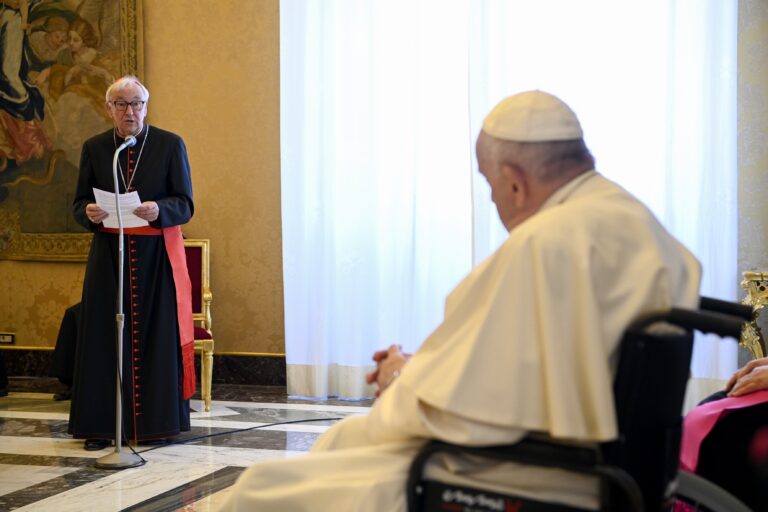Around 30,000 Catholics from England and Wales took part in the local stage of the global Synod process, the largest listening exercise in this local Church to take place over the last 40 years.
“To many of those taking part, the Synod was a revelation,” the national Synod report for England and Wales said. “They spoke of how, after decades of churchgoing, they had been asked to speak for the first time.” Nevertheless, the seeds sown during the process will take time to bear fruit, with the Synod process still unfamiliar territory.
The danger is that the Synod assembly in the Vatican this October will be viewed as something happening “over there” and have little relevance to their lived experiences in parishes. The harvest is rich, but the labourers are few.
Discernment
“I suspect most Catholics in the pews in England and Wales won’t have much awareness of the upcoming Synod in Rome, and may not be sure how it relates to the diocesan processes back in 2022,” says Avril Baigent, the Synod Co-Lead for the Diocese of Northampton and Director of the School for Synodality, a recent established body which aims to help embed practices of listening and discernment in the Church in England and Wales.
“Those who have been following the global Synod sometimes wonder ‘if anything can change’, while there are others that worry that only some voices will be heard. It takes faith to believe that the Holy Spirit is present in what can seem a slow and contentious process.”
Responses to Pope Francis’ call for a synodal Church in England and Wales from Church leaders have been a varied mix of enthusiasm, caution, scepticism and resistance.
The Archdiocese of Liverpool — home to Liverpool Football Club where fans chant the very synodal words of the song “You’ll never walk alone” — began a synodal process in 2018 thanks to the leadership of Dominican archbishop Malcolm McMahon.
In July 2023, the Diocese of Northampton held a synodal assembly, while the Salford diocese has begun a 2023-2035 synod process. Individual parishes, particularly those run by religious orders, have taken up the process and run with it. Wherever the Synod is experienced, people are energised and inspired.
As the Rome Synod assembly begins, Catholics in England and Wales hope that whatever is agreed at the centre can permeate down to the grassroots. The need for reform and renewal is felt acutely by those on the frontline who believe the Church can no longer continue business as usual.
A government inquiry laid bare devastating revelations of clerical sexual abuse and its poor handling by some of the hierarchy. Some dioceses are under severe financial pressure driven by a drop in Mass attendance in the aftermath of the Covid-19 lockdowns.
Vocations to the ordained priesthood are down, and people in the pews want structures that may have worked well 50 or 100 years ago to be rethought. While the Synod doesn’t offer readymade answers to these intractable problems, it is being seen as the way for the Church to start at least asking the right questions.
One of the problems for England and Wales is the significant numbers of clergy remaining indifferent to or fearful of synodal processes, unsure, perhaps, about what it means for their role.
One of the most vocal resistance comes from a small group of ex-Anglicans, including some former Church of England clergy who are now Catholic priests. Inside the special structure set up for ex-Anglicans by Benedict XVI (the Personal Ordinariate of Our Lady of Walsingham), a number have expressed concerns about anything resembling “synodical government” due to their experience of the Church of England’s synod and battles over the ordination of women. Are they unnecessarily fuelling fear about the Synod?
Unlike the Church of England Synod, the synod in the Catholic Church is a consultative, rather than deliberative, body with a strong emphasis on the spiritual process of listening and conversion. This is where the reform is likely to take.
Community
“I have been amazed at the impact of synodal encounters, where true listening leads to encounters of the heart. So many Catholics have said to me ‘I’ve never been asked about my faith before’, Ms Baigent says. “I think that one of the legacies of the Synod will be in the grassroots skill of gracious listening and speaking which can transform our community lives at all levels, helping us discern the Holy Spirit at work among us.”
Those who engaged in the Synod process spoke of their hope for “a loving, merciful, familial and missionary Church in which all are involved” and one “open to the guidance of the Spirit”.
The Synod process has opened up a new horizon, and people in the pews want Church leaders to ensure the Catholic community in England and Wales can become more synodal, participatory and focused on evangelisation.
There are repeated calls for women, described as a “silenced, unrecognised majority” and whose gifts often lie “unwrapped and ignored”, to be better included in leadership and decision-making.
Talking of leadership, the Pope is expected to appoint a new Archbishop of Westminster in the not-too-distant future, given that Cardinal Vincent Nichols is almost three years past the episcopal retirement age of 75. Whoever takes over from the cardinal will be tasked with looking at how to embed synodal reforms at the local level.
In parishes across England and Wales, there is an appetite for what the Synod is offering. The success of the assemblies in Rome, both this October and in October 2024, will rest on how far they can encourage these communities to embrace the renewal process.
Christopher Lamb is a British journalist who is the Rome correspondent for the Tablet. He is a contributor to La Stampa, and a regular commentator for the BBC on Vatican and religious affairs. He is the author of The Outsider: Pope Francis and His Battle to Reform the Catholic Church (2020).



